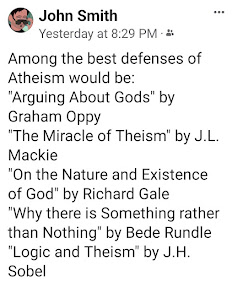Below I've put together thirty of them that most Christians agree on and why they are all improbable:
1) There must be a God who is a simple being yet made up of three
inexplicable persons existing forever outside of time without a
beginning, who therefore never learned anything new, never took a risk,
never made a decision, never disagreed within the Godhead, and never had
a prior moment to freely choose his own nature.
2) There must be a personal non-embodied omnipresent God who created the
physical universe ex-nihilo in the first moment of time who will
subsequently forever experience a sequence of events in time.
In this debate I'm going to focus on the alleged miracle of the virgin birthed incarnate god. Dr. Slade, of the Global Center for Religious Research, will focus on Mary's apparitions and on testing miracles in general. I'm told this will be a two hour program.
IS RELIGION COMPATIBLE WITH SCIENCE? by Dr. David Eller (pp. 257-278). [This is a 4000 word excerpt out of 8600 words. Get the book!]

In most of the squabbles between religion and
science, religion is never defined, because, since most of the squabbles are
occurring in majority-Christian societies, the assumption is that “religion”
means “Christianity.” Worse yet, the assumption is usually that “religion”
means “traditional Christianity” or “evangelical/fundamentalist Christianity.”
Substituting one of these terms for “religion” in our original question yields
the highly problematic inquiry: Is traditional/evangelical/fundamentalist Christianity
compatible with science?
The first problem, of course, is that even if it is
not, then perhaps some other form—some modernist or liberal form—of
Christianity is compatible with science; perhaps
Christianity can be adjusted and juked to fit with science. The second and more
profound problem is that even if traditional/evangelical/ fundamentalist
Christianity or any version of Christianity whatsoever is not compatible with
science, perhaps some other religion—say, Hinduism or Wicca or ancient Mayan
religion or Scientology—is. Yet you will notice that almost no one asks, and
almost no one in the United States or any other Christian-dominated society
cares, whether Hinduism or ancient Mayan religion is compatible with science,
since few people know or care about Hinduism or ancient Mayan religion. The
tempest over religion and science is thus quite a local and parochial brouhaha,
people fighting for their
particular religion against
(some version or idea of) science.
Wow! Christians nabbed another atheist based on faulty perceptions.
[First published on 10/5/20] Because this is the haunted month of Halloween
here's something to spook ya all!
I'm always interested in new angles to argue my case
against Christianity. Kris Keys does that in the excellently researched
essay below. He argues there is more evidence for the resurrection of
Vampires and Revenants than there is for the resurrection of
Jesus.
Introductory comments by Kris Keys:
Well this is my first time writing a blog post and little
did I know it would be for the website Debunking Christianity!! I find
this to be completely hilarious as I am not in of myself militantly
opposed to Christianity in of itself; I tend to dislike Evangelicals but
that is because I view them as hypocritical and blatantly power hungry
but of course this description would not apply to all Christians. As
probably the readers of this post have deduced by now I am not a
Christian, but I am also not an atheist either. I tend to be rather
eclectic in my views. I fancy myself to be broad minded and open to
change.
I am a schoolteacher by profession, and I have taught both social
studies and science at the high school level. I have dual degrees in
both fields. In my not remotely enough spare time I enjoy reading
folklore, Medieval history, sociology, anthropology and other subjects.
Basically a lot of stuff. Over the years I have heard the
Christian argument for the physical resurrection of Jesus and at one
time I found this argument to be convincing, but more and more for many
varied reasons I became rather skeptical of it.
None of this explains though, how this essay came about! Nothing
remarkable about it really. I was scrolling through Facebook and I saw
John Loftus’s profile. In discussion with him I mentioned that one could
use the resurrection argument to demonstrate the existence of vampires
and I showed him a response I wrote to a friend of mine on this.
John asked me to do a write up
for him.
So here is a write up I never seriously figured I would write up on a
blog, one that I never suspected I would write for. So I hope everyone enjoys
it. So without further ado, here is my attempt to show that the
Christian argument for the resurrection of Jesus would also demonstrate
vampires exist. I will leave it up to you dear readers to determine if
Jesus rose from the dead and if you need to invest in crucifixes and
garlics now; or that perhaps claims of the dead returning bodily just
should not be given the benefit of the doubt. You decide.
I am a follower of John Smith at Facebook, who writes some very good provocative stuff. This Facebook post of his to the left provokes some thought too. He suggests a few works he considers to be the best defenses of atheism. They are all sophisticated philosophical treatises.
Sure, I'm a gadfly, but there are people who think the best atheist arguments come from atheist philosophers. Who or what is the source of this ignorance? Where does it come from? I think it comes from Christian philosophers themselves, because it can and does serve as a red herring leading people away from some powerful atheist arguments.
When I show up and offer a different perspective they treat me with a touch of tribalism, and/or they ignore me. It doesn't have to be that way. There is room for all types of argumentation from Biblical/Religious scholars and especially scientists.
Alex Pinkney graded philosophical arguments, since apparently, he considers them the best that atheists have to offer. He wrote:
Watch this then think, we don't even have an eyewitness of the resurrection of Jesus:
The traditional argument from evil claimed that God
was incompatible with any amount of suffering, for God could, and would want
to, prevent every instance of it. Most philosophers nowadays regard that as too
strong. A certain amount of suffering might be allowed by God, provided there
is a morally sufficient reason for his allowing it—provided, in other words,
the suffering serves some greater purpose or is the unavoidable consequence of
something that justifies its existence. For instance, it may be that our having
free will is a great good which more than compensates for any evil actions
resulting from that freedom. Or it may be that certain types of suffering are
the only way to bring about something of immense value. As an example of the
latter, it is possible that in order to freely develop into the sort of beings
that God wants us to become, we must first overcome certain challenges—and
these may include disappointments, feelings of frustration, and other
experiences we would prefer not going through. (As some theists put it, God’s intention
was not to create a paradise in which to keep us perfectly happy, but to create
a place where we can grow and develop into persons worthy of spending eternity
with him.) It is also possible that an instance of suffering today is the least
terrible means of preventing a far greater amount of suffering at some future
date. Each of these, as well as several other possibilities that will be
discussed below, provides a conceivable explanation for at least some of the
bad things that happen in this world.
But
even if God is not incompatible with all suffering, he is incompatible with
suffering that cannot be justified by some outweighing benefit. Such suffering
would be senseless or gratuitous, and if we are to take seriously the claim
that God is perfectly good as well as all-powerful and all-knowing, we cannot suppose
that he would let someone suffer without reason. If one has the ability to
prevent such pointless suffering, yet fails to do so, one cannot be considered
morally perfect. It follows that there can either be a God, or there can be
senseless suffering, but not both. This leads to a very simple argument in
support of atheism:
Every Monday morning I'm posting submitted essays, excerpts from my books, and some of the best posts of the past. Here's one from January 17, 2012.
This topic interests me to no end. Why don't most believers seriously question their faith? Does it take a special type of individual? Does it require some personality trait that believers don't have? Does that make skeptics different people? Could it be intelligence? Could it be that skeptics have a higher self-esteem than others? Is it that we don't need social approval? Is it that life's experiences have shown us we cannot accept the dominant opinion on a matter? Is it that we question what we're told in general? Perhaps, but when we look at skeptics in general there doesn't seem to be a set pattern. Perhaps a scientific poll might help answer that kind of question. What I do think is that the following ten reasons are almost certainly necessary conditions even if they are not sufficient ones:
My plan is to post something of interest every Monday morning. These posts will include excerpts from my books, submitted essays, posts made here in the past, and new ones. Enjoy.
The Trickster’s Apprentice
By David Eller
At the end of the first part of Thus Spake Zarathustra, Nietzsche has Zarathustra withdraw into his solitude, asking, “what matter all believers? You have not yet sought yourselves: and you found me. Thus do all believers; therefore all faith amounts to so little.” In a previous essay, I introduced the figure of the trickster, the mischievous, unrestrained, shape-shifting boundary-crosser to whom many pundits have likened Trump. I realize now that that essay was the first of a two-part musing on faith and following, inspired by this cross-cultural fact: people don’t usually follow tricksters. They may laugh at him (since, as I pointed out previously, a trickster is almost always a male, at least at first), they may be aghast at his disrespect of morals and traditions, they may dread his baleful influence. A trickster is always a destroyer, usually a creator, sometimes a buffoon or cautionary tale, but virtually never a leader. Who would choose the trickster’s world of chimeras, deceptions, and insatiable appetites?























